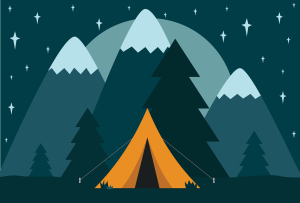 Fatalities have risen this summer and as there are still a few weeks remaining until the end of the season the government have been pushing preventative warnings out to all holiday makers. Deciding to go camping or to stay in a caravan sounds like a harmless and easily planned event. This is why it is popular with older people, as it is easy to travel to and any disabilities or medical conditions can usually be easily managed, especially with a caravan as it is basically just a smaller version of your own home. However there are a few things that must be remembered when doing so, otherwise your holiday could go disastrously wrong.
Fatalities have risen this summer and as there are still a few weeks remaining until the end of the season the government have been pushing preventative warnings out to all holiday makers. Deciding to go camping or to stay in a caravan sounds like a harmless and easily planned event. This is why it is popular with older people, as it is easy to travel to and any disabilities or medical conditions can usually be easily managed, especially with a caravan as it is basically just a smaller version of your own home. However there are a few things that must be remembered when doing so, otherwise your holiday could go disastrously wrong.
The main cause of fatalities has been due to carbon monoxide poisoning and related dangers. Carbon monoxide is a highly poisonous substance which is created when fossil fuels such as gas and solid fuels like charcoal and wood fail to combust fully due to a lack of oxygen. You can’t see it, taste it or smell it, but it can kill quickly with no warning.
This is usually caused by people cooking inside or allowing their BBQ’s to cool off inside the tent or caravan. When fuels are burning, the carbon monoxide being emitted is converted into relatively harmless carbon dioxide. But once the flame has gone out carbon monoxide continues to be produced and is no longer burnt off. The fumes build up in such an enclosed space quickly and many have died from inhaling carbon monoxide while they sleep. As carbon monoxide is inhaled, it enters the bloodstream and binds to the haemoglobin in red blood cells, replacing and blocking the oxygen molecules, which are normally attached. Your body is slowly starved of its oxygen as it cannot bind to the haemoglobin or travel into any tissues.
Another danger is from using open flame gas stoves, which if are not working properly or are left on can release harmful carbon monoxide. The open flames from a stove or BBQ also increase the risk to those that use oxygen as it is highly combustable and there have been incidences of explosions and severe burns where people have been cooking with their oxygen close by.
Make sure that tubing does’nt become tangled, equipment is secure and not used near open flames.
Oxygen therapy is the main treatment for carbon monoxide poisoning as the high concentration levels of oxygen basically forces displacement of the carbon monoxide molecules from the haemoglobin so that the oxygen can take its place. If you do start feeling any symptoms that could be carbon monoxide poisoning then having your oxygen close to hand could save your life. Some people keep their portable concentrator near to them when they sleep in case they awaken with breathing difficulties.
Barbeque safety
Never take a smouldering or lit BBQ into a tent, caravan or cabin. Even if you have finished cooking the BBQ should remain outside as it will still give off fumes for some hours after use
Never use a BBQ inside to keep you warm
Never leave a lit BBQ unattended or while sleeping
Place your cooking area well away from your tent. Always ensure there is an adequate supplyv of fresh air in the area where the BBQ is being used
Symptoms of CO poisoning include:
• headaches
• drowsiness
• dizziness
• chest pains
• nausea
• vomiting
At high levels, CO poisoning can cause:
• sudden collapse
• loss of consciousness
• death
It’s not just BBQ season that you need to worry about CO poisoning, with winter around the corner many deaths occur from faulty boilers and open flames being used to help heat the home.
If you already have respiratory issues then even a small amount of carbon monoxide can greatly impact your oxygenation and breathing so ensure you have a monitor at home.
Carbon monoxide advice
Warning signs can include symptoms that disappear if you are away from your house, or which are worse in winter when the central heating is on more
Other people in the house, or pets, fall ill with similar symptoms
Clues to a leak can include black, sooty marks around gas fires, boilers or stoves
Smoke building up in rooms due to faulty flues
Do not sleep in a room that has an unflued gas fire or a paraffin heater
Make sure your kitchen has an extractor fan
Yellow instead of blue flames from gas appliances
To be safe, you should never use ovens or gas ranges to heat your home
Never use oversized pots on your gas stove, or place foil around the burners
Make sure rooms are well-ventilated and do not block air vents
References: www.bbc.co.uk/news/health and www.gov.uk




